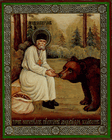http://commons.wikimedia.org/wiki/File:James_the_Just_-_icon.jpeg
James the Just (?-62 A.D.), also knows as James the brother
of Yeshua is reckoned as being the first Bishop of Jerusalem. There are many questions about exactly who he
was. Depending on theology or
churchmanship, some reckon him to be the son of Miriam (Yeshua’s mother),
others think him to have been a son by previous marriage to Yosef, while others
think he was a cousin to Yeshua (at issue here is the perpetual virginity of
Miriam*). Whichever he was, he
apparently did not recognise Yeshua as Messiah, until after Yeshua’s
resurrection, as St. Paul
tells us that Yeshua appeared to James, the brother of the Lord. Interestingly enough, the ancient Greek
texts call him Iάκωβος ο Αδελφόθεος,
which literally means, James, the brother of God, which would seem to indicate
that he actually was Yeshua’s brother.
James is important to us chiefly through his writings. We find his writing and thoughts in the 15th
chapter of the book of Acts:
Men and brethren, hearken unto me: Simeon hath declared how
God at the first did visit the Gentiles, to take out of them a people for his
name. And to this agree the words of the prophets; as it is written, After this
I will return, and will build again the tabernacle of David, which is fallen
down; and I will build again the ruins thereof, and I will set it up: That the
residue of men might seek after the Lord, and all the Gentiles, upon whom my
name is called, saith the Lord, who doeth all these things. Known unto God are
all his works from the beginning of the world. Wherefore my sentence is, that
we trouble not them, which from among the Gentiles are turned to God: But that
we write unto them, that they abstain from pollutions of idols, and from
fornication, and from things strangled, and from blood. For Moses of old time
hath in every city them that preach him, being read in the synagogues every Sabbath
day." In other words, the ruling
found here and elsewhere in acts frees gentiles from following the Jewish
dietary (except for blood and strangled animals) and ceremonial laws, but binds
Christians to the Jewish laws of morality, especially sexual morality.
James also gives us the Epistle of James, giving us
instruction in prayer and in healing.
James 3:16, “Faith without works is absolutely dead,” which added
balance to what St. Paul
stated about faith and works. (To put it
plainly, we have salvation by what Yeshua did for us on the cross. All we have to do is accept that. But once we have done so, our life should be
rich in works that demonstrate that we are God’s children.).
Historically, James is believed also to be the author of the precursor of the
rite of St. James used by the Eastern Orthodox church on certain feast days
(and used by our church most Sundays.)
Also with James begins a long line of Jerusalem bishops who were physically related
to Yeshua, all through Miryam, the mother of Yeshua. The last of these was Judas, who died in the
year 135 A.D. After 135, all Bishops of Jerusalem were Greek.
James was asked to preach to the people of Jerusalem, but when he began proclaiming
Yeshua, was hurled to the ground and beaten to death with a fuller’s club. Some hesitated because they heard him praying
for them. According to Josephus, many of
the residents of Jerusalem
considered this to be a political assassination.
Lessons:
Eucharistic:
Psalm 1
Acts 15:12-22a
1 Corinthians
15:1-11
Matthew
13:54-58
Preface of All Saints
Daily Office:
AM:
Psalm
119:145-168
Jeremiah
11:18-23
Matthew
10:16-22
PM:
Psalm 122,
125
Isaiah
65:17-25
Hebrews
12:12-24
Collect: Oh Lord,
as James the Just, brother of Yeshuah worked for reconciliation through prayer
and preaching, grant that we too may fervently pray for the kingdom. This we ask through Yeshuah, who lives and
reins with you and Ruach haKodesh, one God in glory everlasting. Amen. (red)
*The perpetual virginity of Miriam did not become church doctrine
until the 4th century, lending some doubt to the doctrine. We note that as well in the 4th
century the development of the idea that celibate Christians were considered
better Christians than non-celibate, and we wonder if the whole case of Miriam’s perpetual
virginity rests on these 4th century ideas, when monks and nuns were
becoming the super-Christians of the church.














